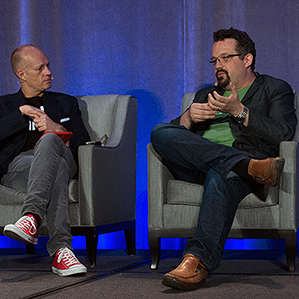Digital Summit: Wearable Computers Mean the End of Apps and Ads
The smartphone era has also been the age of apps. But those specialized, standalone pieces of software will soon be an anachronism, says the CEO of the popular information-management service Evernote. He predicts that as wearable computers supplant smartphones, they will displace apps, too.

In an on-stage interview Monday at the MIT Technology Review Digital Summit, Evernote’s Phil Libin said that the advantage of smart watches or other computers worn on the body is that they can instantly deliver information that is finely tuned to a particular context. For example, Google Glass might provide background on the person you’re speaking to.
But that kind of service won’t succeed if a person must remember to fire up a given app in situations in which it might be helpful, Libin said. He argued that people will instead prefer “ambient” services that constantly run in the background and then step forward as needed.
“Apps are becoming irrelevant or becoming much less important,” Libin said. “I think the killer app for this thing [wearable computing] is hyper awareness. I basically want to have a Spidey sense.”
Libin’s vision is undoubtedly shaped by the fact that Evernote sells services that could fit into the scenario he describes—they store notes and other personal information for you to call up later.
Libin also argued that the dominant business model on wearable devices will be user subscriptions—like Evernote’s—rather than ads. The reason, he said, is that as devices get more intimate—with small screens just inches from the eyes—people will cringe at advertising. How much tolerance might people have for ads on a device like Google Glass? “Really, really, none at all. Zero,” Libin said.
Libin noted, to laughter from the audience, that this idea might seem somewhat counterintuitive. The intense data-collection made possible by wearables might seem like an advertiser’s dream. But he was adamant that finely tuned, ultra-targeted ads are not really a killer application for most consumers. “I just call bullshit on that,” he said.
Keep Reading
Most Popular
Large language models can do jaw-dropping things. But nobody knows exactly why.
And that's a problem. Figuring it out is one of the biggest scientific puzzles of our time and a crucial step towards controlling more powerful future models.
How scientists traced a mysterious covid case back to six toilets
When wastewater surveillance turns into a hunt for a single infected individual, the ethics get tricky.
The problem with plug-in hybrids? Their drivers.
Plug-in hybrids are often sold as a transition to EVs, but new data from Europe shows we’re still underestimating the emissions they produce.
Stay connected
Get the latest updates from
MIT Technology Review
Discover special offers, top stories, upcoming events, and more.